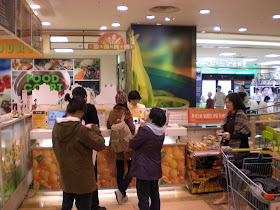 Julianne and I went to E-MART tonight for dinner and to get a few things.
Julianne and I went to E-MART tonight for dinner and to get a few things. In the food court there are glass display units full of the menu choices for all of the stores.
In the food court there are glass display units full of the menu choices for all of the stores.

 After perusing the selection you walk over to a clerk and he/she takes the order and gives you a receipt with an order number on it.
After perusing the selection you walk over to a clerk and he/she takes the order and gives you a receipt with an order number on it.
 You then find a place to sit and wait. It's nice that you can sit down while your food is being cooked. Usually there is some kind of chime that goes off each time one of the stores has an order that is ready. When you hear a chime or sound you just glance up and check if it is your order number.
You then find a place to sit and wait. It's nice that you can sit down while your food is being cooked. Usually there is some kind of chime that goes off each time one of the stores has an order that is ready. When you hear a chime or sound you just glance up and check if it is your order number. One thing that shocks most foreign people the first time they go to a Korean department store food court is the COMPLETE LACK OF POP. You will NOT see Coke, Pepsi, or any other kind of soda in most food courts in Korea.
One thing that shocks most foreign people the first time they go to a Korean department store food court is the COMPLETE LACK OF POP. You will NOT see Coke, Pepsi, or any other kind of soda in most food courts in Korea.Water. Hot or cold--that's it. This might have a lot to do with why Koreans are generally thinner than North Americans . . .
 The metal unit on the right is an ultra-violet ray steel cup shelving unit that is very common in Korea. I'm not sure how much UV rays actually sterilize anything but it seems to be the common practice here. I looked it up on wikipedia, and the conclusion is not that reassuring: "However, since microorganisms can be shielded from ultraviolet light in small cracks and other shaded areas, these lamps are used only as a supplement to other sterilization techniques."
The metal unit on the right is an ultra-violet ray steel cup shelving unit that is very common in Korea. I'm not sure how much UV rays actually sterilize anything but it seems to be the common practice here. I looked it up on wikipedia, and the conclusion is not that reassuring: "However, since microorganisms can be shielded from ultraviolet light in small cracks and other shaded areas, these lamps are used only as a supplement to other sterilization techniques." Julianne and I were walking to a table when we ran into some students from my university. Another professor and I split 30-40 students in half and these halves make up our individual classes within the Classroom English course (one of the courses I teach).
Julianne and I were walking to a table when we ran into some students from my university. Another professor and I split 30-40 students in half and these halves make up our individual classes within the Classroom English course (one of the courses I teach).So the students from my half, and the students from his, are actually a part of the same class. In Korean national universities of education classes stay together for the duration of their four years of study and take the same courses together too. The students know each other pretty well at the end of the four years after having taken every course, test, done every project, and taken every exam together.
I jokingly asked the students if they had 'heard stories about me' and they laughed and said yes. Later, one of them came over to Julianne and I and gave us a little thing of cookies. It's always a good sign that you're doing something right if the students are giving you a little candy, or some food.
 This is what we ordered, "Tongsuyuk" (too lazy right now to check the spelling).
This is what we ordered, "Tongsuyuk" (too lazy right now to check the spelling). This is what we got. One of the these things is NOT like the other--more VEGGIES JUSEYO ('give me please').
This is what we got. One of the these things is NOT like the other--more VEGGIES JUSEYO ('give me please'). It was kind of nice to see the food court empty. It meant that we weren't being stared at while we ate. Most of the time it doesn't bother me, but Julianne is still adjusting.
It was kind of nice to see the food court empty. It meant that we weren't being stared at while we ate. Most of the time it doesn't bother me, but Julianne is still adjusting. After eating we walked around the second floor of E-MART looking at everything and anything from electronics to the toy section.
After eating we walked around the second floor of E-MART looking at everything and anything from electronics to the toy section.Then we moved downstairs to the grocery level and bought a few things.
Julianne noticed these guys . . . wow.
 So we snuck a picture of the insanely expensive Colby Monterey Jack cheese that we bought for 10 700won.
So we snuck a picture of the insanely expensive Colby Monterey Jack cheese that we bought for 10 700won. From wikipedia.com,
From wikipedia.com,"Pepero Day is an observance in South Korea similar to Valentine's Day or Sweetest Day. It is named after the Korean snack Pepero and held on November 11, since the date "11/11" resembles five sticks of Pepero. The holiday is observed mostly by young people and couples, who exchange Pepero sticks, other candies, and romantic gifts.
According to one story, Pepero Day was started in 1994 by students at a girls' middle school in Busan, where they exchanged Pepero sticks as gifts to wish one another to grow "as tall and slender as a Pepero" (Pepero means "thin like a stick"). However, it is more likely it was initiated by Lotte, the company which produces Pepero.
In Japan, a similar Pocky Day was held on November 11 in 1999, which was the 11th year of the Heisei era. The date, 11/11 of the 11th year, resembled 6 sticks of Pocky." I have a hard time not looking at Pepero Day in Korea through the socio-cultural lens of my own cultural identity and experience. Koreans in general don't seem to know anything about November 11th and what, I think it's pretty safe to say, 'the rest of the world' does every year on this special day.
I have a hard time not looking at Pepero Day in Korea through the socio-cultural lens of my own cultural identity and experience. Koreans in general don't seem to know anything about November 11th and what, I think it's pretty safe to say, 'the rest of the world' does every year on this special day.From wikipedia.com,
"Remembrance Day – also known as Poppy Day, Armistice Day (the event it commemorates) or Veterans Day – is a day to commemorate the sacrifices of members of the armed forces and of civilians in times of war, specifically since the First World War. It is observed on 11 November to recall the end of World War I on that date in 1918. The day was specifically dedicated by King George V, on 7 November 1919, to the observance of members of the armed forces who were killed during war; this was possibly done upon the suggestion of Edward George Honey to Wellesley Tudor Pole, who established two ceremonial periods of remembrance based on events in 1917."
Also from wikipedia.com,
World War I
"Over 40 million casualties resulted, including approximately 20 million military and civilian deaths."
World War II
"Over 70 million people, the majority of them civilians, were killed, making it the deadliest conflict in human history."
All I'm saying is that maybe Koreans could alter Pepero Day slightly and have major portions of the profits made by selling chocolate sticks go to Korean war veterans and other charities they deem appropriate.
It might also be nice if some sort of international/global awareness was developed of what goes on in the majority of other countries on November 11th . . .
Anyways . . . walking back to our apartment we saw this,
 I think it's cool that traditional drying practices are still pretty wide-spread in Korea. I've never seen anything like this in Canada and I wonder what we've lost through the modernization of harvesting and food production practices . . .
I think it's cool that traditional drying practices are still pretty wide-spread in Korea. I've never seen anything like this in Canada and I wonder what we've lost through the modernization of harvesting and food production practices . . . Tomorrow . . . shopping in SEOUL! Woohoo . . .
Tomorrow . . . shopping in SEOUL! Woohoo . . .J






























































































